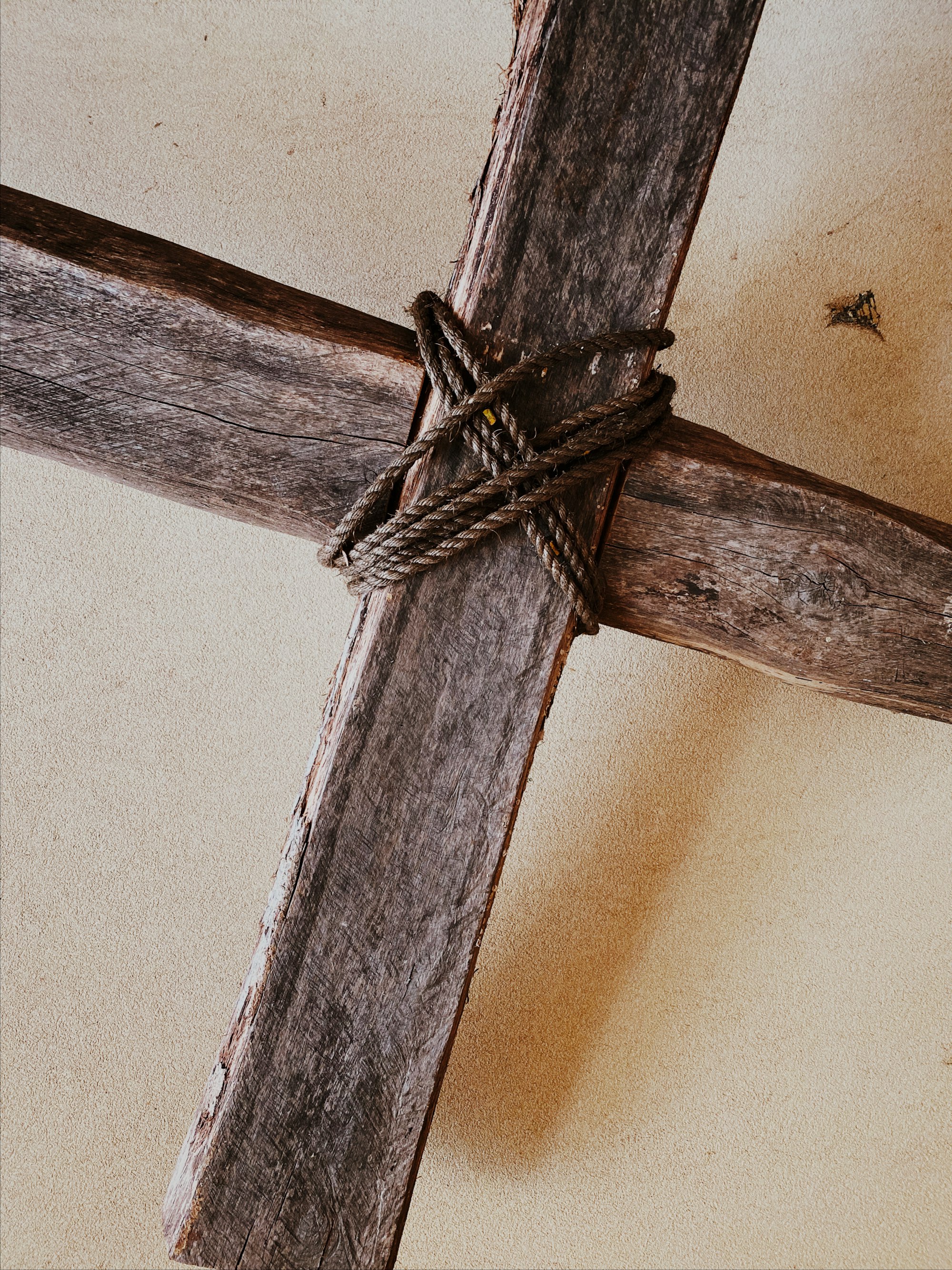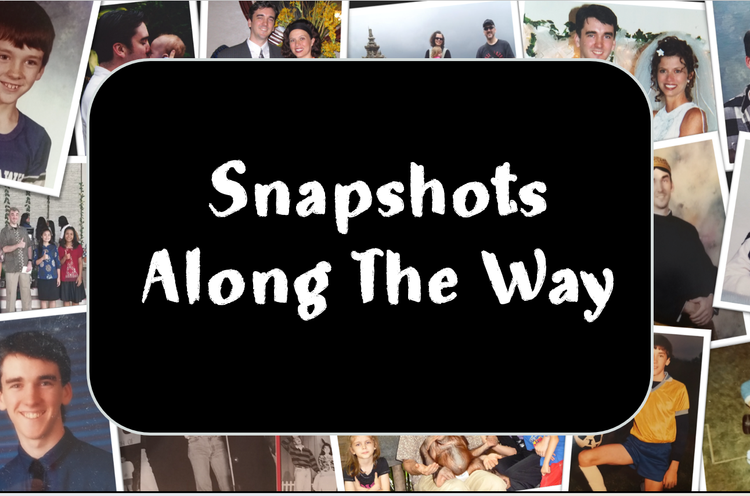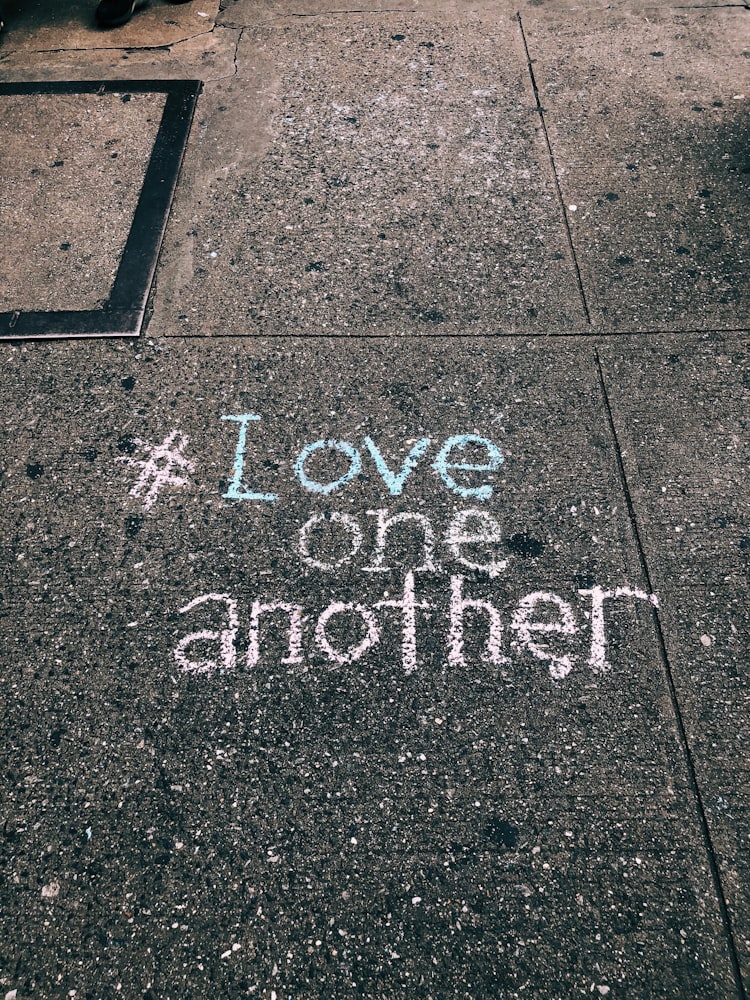The Calling

A story based on Matthew 8:34-38
Sarah Wilson drummed her fingers along the arm of the red velvet chair in Pastor Mike's office, the faint scent of old books and coffee lingering in the air. She'd rehearsed this conversation for weeks, but the words still felt trapped in her throat. Outside the window, the familiar landscape of Mapleton—population 6,872—spread out like a well-worn quilt. This had been her home for all thirty-four years of her life.
The small church spire peeked above the maple trees that gave the town its name, a constant landmark in Sarah's journey of faith. Three generations of Wilsons had worshipped in those pews, served on committees, and contributed to bake sales. Her grandfather had helped build the fellowship hall; her mother still organized the annual Christmas pageant.
"I'm thinking about leaving my job at the firm," she finally said, her voice steadier than she expected. "I want to move to Chicago to work with refugee resettlement agencies."
Pastor Mike's eyebrows shot up as he set down his coffee mug. The late afternoon light caught the steam rising from it, creating a momentary halo effect that wasn't lost on Sarah. Small signs, she thought. She'd been noticing them everywhere lately.
"That's... quite a decision, Sarah. The law firm just made you junior partner last year." He leaned forward, his worn Bible on the desk between them. "What's prompting this?"
"Three weeks ago, during that mission Sunday service, when Reverend Garcia spoke about his work with refugees at the border..." Sarah paused, searching for words to describe the inexplicable certainty that had gripped her that day. "It was like he was speaking directly to me. I couldn't sleep that night. Or the next."
She pulled a small, leather-bound journal from her bag—a gift from her late father on her law school graduation. "I've been praying about this, wrestling with it. Reading about Abraham in Genesis, about leaving the familiar for the unknown. About Moses stepping into a new identity beyond the palace. About Ruth following Naomi to a foreign land."
Pastor Mike nodded slowly, familiar with the wrestling that comes when scripture begins to rearrange someone's life. He'd seen it before, though rarely with someone as established in their career as Sarah.
"And what about your mother? Your team at the firm?" he asked gently.
"That's why I'm here," Sarah admitted. "I need wisdom. Everyone thinks I'm making a terrible mistake."
The conversation that followed was the first of many similar ones over the next few weeks. Her mother, Eleanor Wilson, couldn't comprehend why her daughter would trade security for uncertainty.
"Your father worked so hard to put you through law school," Eleanor said over their weekly Sunday dinner, her pot roast growing cold as Sarah explained her plans. "He would have wanted you to build something stable. Something permanent."
Sarah looked around the dining room where generations of family milestones had been celebrated. The china cabinet still held her grandmother's wedding dishes; the wall displayed her own academic achievements alongside those of her parents.
"I think Dad would have understood," Sarah said quietly. "Remember how he always quoted that verse from Micah? 'What does the Lord require of you but to do justice, love mercy, and walk humbly with your God?'"
Eleanor's eyes welled with tears. "He meant here, Sarah. In your community. Where your roots are."
At Williams, Hoffman & Pierce, the reaction was equally perplexed. The law firm occupied the tallest building in Mapleton—four stories of red brick overlooking the town square. Sarah had interned there during law school summers and joined immediately after passing the bar. Her office window offered a view of the courthouse where she'd won her first case defending a local farmer against a corporate land grab.
"You're throwing away a career that people would kill for," said Richard Pierce, the senior partner who had mentored her for years, his voice echoing in the wood-paneled conference room. "For what? Some idealistic notion of helping strangers?"
"Not strangers, Richard. People with names and stories who need legal expertise to navigate impossible situations," Sarah replied, thinking of the case files she'd been studying online—families separated at borders, individuals fleeing persecution, communities displaced by conflict and climate change.
"If it's more pro bono work you want, we can arrange that," Richard countered, glancing at the firm's other partners. "Local cases. People right here who need help."
Sarah nodded, acknowledging the olive branch. "I appreciate that. But this feels different. More... urgent."
Even at church, where Sarah expected to find support, the responses were lukewarm at best. Mapleton Community Church prided itself on mission work—they sent youth groups on summer service trips and sponsored two children in Guatemala—but the idea of one of their own leaving a prestigious position to serve seemed to challenge an unspoken boundary between charity and calling.
"Couldn't you just volunteer at the local shelter on weekends?" suggested Mrs. Hendricks after Sunday service, her hand resting on Sarah's arm. The older woman had taught Sarah in Sunday School years ago. "Or write a check to a good charity? You're already a faithful member here—isn't that enough?"
The question lingered with Sarah as she drove home, past familiar landmarks—the high school where she'd been valedictorian, the park where she'd played as a child, the coffee shop where she now mentored pre-law students from the community college.
At night, alone in her apartment, Sarah would spread her legal papers across her dining table, meticulously working through cases while a different set of documents lay open on her laptop: information about refugee crises, affordable housing options in Chicago, and job openings at non-profits. The contradiction of her two lives felt increasingly unsustainable.
She began attending a Wednesday night Bible study led by Pastor Mike, focusing on the concept of calling in scripture. The small group met in the church library, surrounded by theological texts and the faint smell of furniture polish.
"We often reduce calling to career," Pastor Mike explained one evening, as they discussed Paul's dramatic conversion on the Damascus road. "But in scripture, it's about identity and purpose aligned with God's vision for the world. Sometimes that disrupts our carefully constructed plans."
Sarah glanced around the circle—familiar faces from the congregation, most settled comfortably into predictable rhythms of small-town life. Had they ever felt this kind of divine disruption? This persistent tug toward something that made no practical sense?
"But how do you know when it's really God calling, versus just your own ideas or emotions?" asked Dave Peterson, who ran the local hardware store. "No offense, Sarah, but couldn't this just be, I don't know, a midlife crisis or something?"
Several others nodded, and Sarah felt a momentary doubt cloud her certainty.
Pastor Mike interjected gently. "Scripture gives us some guidance there. A true calling generally aligns with God's character as revealed in scripture—particularly God's concern for justice and compassion. It often requires sacrifice rather than self-advancement. And it typically finds confirmation in community, even if not immediate approval."
Later, as the group enjoyed coffee and cookies, Beth Martinez, a nurse at the local hospital, approached Sarah privately.
"My grandmother was a refugee from Cuba in the 1960s," she said quietly. "The church that sponsored her family changed everything for them. I just wanted you to know... I understand what you're feeling called to do."
It was the first unequivocal support Sarah had received, and she held onto it like a lifeline.
One evening, while on a walk through Mapleton's central park, Sarah ran into her high school English teacher, Ms. Rivera, who had retired the previous year. The park's gazebo was decorated with lights for the upcoming Founder's Day celebration, casting a gentle glow as twilight descended.
"Sarah Wilson! Just the person I was hoping to run into," Ms. Rivera called, waving her over to a bench. "I've been hearing rumors about your plans. Tell me everything."
For the next hour, Sarah poured out her heart—the sense of calling that had ambushed her, the research she'd been doing, the resistance she'd encountered, the doubts that sometimes kept her awake at night.
"I always knew you'd do something unexpected," Ms. Rivera said after hearing Sarah's plans, her eyes crinkling at the corners. "Everyone else sees what you'd be giving up. But I'm curious—what do you think you'd be gaining?"
The question lingered with Sarah long after they parted ways. That night, she wrote in her journal:
What would I gain? Purpose. The chance to use my legal skills to help people navigate impossible situations. The opportunity to live out my faith in ways that stretch beyond Sunday services. Connection to the wider world that God so loves. A perspective beyond the comfort of familiarity. Maybe I'm naive, but I can't escape the feeling that this is exactly what I'm supposed to do with my life. Jeremiah 29:11 keeps coming to mind: "For I know the plans I have for you," declares the LORD, "plans to prosper you and not to harm you, plans to give you hope and a future."
The following Sunday, Sarah volunteered at the church's monthly community dinner. While setting up tables in the fellowship hall, she overheard two deacons discussing her situation.
"It's impulsive, if you ask me," said Mr. Collins, arranging silverware in precise rows. "People her age think they need to do something dramatic to make their faith meaningful. Next thing you know, she'll be back in six months, broke and looking for her old job."
"Still," countered Mrs. Decker, "there's something admirable about it. Reminds me of those missionaries we support in Thailand."
"Missionaries have organizations behind them, proper training," Mr. Collins replied. "This is just... reckless enthusiasm."
Sarah slipped away before they noticed her, finding refuge in the church kitchen where she busied herself with food preparation. The words stung, but she recognized the kernel of truth in them. Was she being reckless? Should she seek more preparation, more training, before making such a leap?
That afternoon, she reached out to Reverend Garcia, the mission speaker who had inadvertently sparked her journey. His response came within hours—a lengthy email detailing organizations in Chicago that combined legal advocacy with refugee support, training programs she might consider, and an offer to connect her with colleagues in the field.
Remember, Sarah, he wrote, that God rarely calls us to comfort or convenience. The disciples left their nets immediately to follow Jesus. Sometimes the most faithful response is simply to go, trusting that the path will become clearer with each step.
Two days later, Sarah was organizing files in the firm's conference room when Richard Pierce stopped by. His tall frame filled the doorway, his expression uncharacteristically tentative.
"I heard you're serious about this Chicago thing," he said, leaning against the doorframe. "The partners had a meeting yesterday. We don't want to lose you, Sarah."
He crossed the room and sat at the conference table, motioning for her to join him. The afternoon sun slanted through the blinds, creating stripes of light across the polished wood.
"The partners have authorized me to offer you an alternative. We'll let you take pro bono cases—immigration, asylum seekers, whatever you want—for up to thirty percent of your billable hours. You keep your partnership track, your benefits, everything. Just stay."
It was a generous offer. One that made logical sense. One that would allow her to help people without upending her entire life. Sarah studied Richard's face—the man who had guided her career, who had believed in her potential before she fully saw it herself.
"I need some time to think about it," she said finally.
"Of course," he replied, standing to leave. At the door, he paused. "Just don't confuse sacrifice with purpose, Sarah. Sometimes the wiser path is to work within the system you know."
That evening, Sarah drove to Lake Mapleton, a small reservoir just outside town where she often went to clear her head. The water reflected the sunset in dramatic streaks of orange and pink. She thought about Moses standing before the burning bush, making excuses about his inadequacies. She thought about Jonah running in the opposite direction from Nineveh. She thought about Mary's simple "Let it be unto me according to your word," spoken despite the scandal and hardship that would follow.
What was her own response to be?
She called her mother that night and asked to see the family Bible. When Eleanor brought it over, they sat together on Sarah's couch, turning the oversized pages filled with generations of birth and death dates, marriages and baptisms.
"I found this when your father died," Eleanor said, pulling a folded piece of paper from between the pages. It was a letter her father had written years ago, tucked away and forgotten until now.
My dearest family, it read in his familiar handwriting, My life has been blessed beyond measure, not by what I've accumulated or achieved, but by how I've been permitted to serve. Whatever inheritance I leave, I hope the most valuable part is this understanding: that we are called not to comfort but to purpose, not to security but to faithfulness. May you have the courage to follow God's call, even when—especially when—it leads beyond the familiar paths.
Sarah looked up at her mother, who was wiping away tears.
"He would have supported you," Eleanor admitted. "He always said you had his spirit of adventure, just channeled into different paths."
That Sunday, Pastor Mike's sermon focused on Abraham's call to leave his homeland. The church was fuller than usual, perhaps because word had spread about Sarah's decision.
"Faith often asks us to step into uncertainty," he said, his eyes finding Sarah's in the congregation. "The comfortable path is rarely the transformative one. Abraham was already established, respected in his community. He had no logical reason to leave everything behind except for this: God called, and he answered."
Pastor Mike then did something unexpected. He asked Sarah to come forward.
"Our sister Sarah believes she has heard God's call to serve in a new place, using her considerable gifts to help those seeking refuge," he announced. "While we will miss her presence among us, we want to send her with our blessing."
The gesture moved Sarah deeply, though she noticed mixed reactions in the congregation—some nodding approval, others shifting uncomfortably in their seats.
After the service, several church members approached Sarah with well-intentioned concerns.
"You know, you can be just as good a Christian right here in Mapleton," said Mrs. Thomas, squeezing Sarah's hand. "God doesn't require us to be martyrs."
"I'm not trying to be a martyr," Sarah replied gently. "I'm just trying to be obedient to what I believe God is asking of me."
Mr. Rivera, the high school principal and Ms. Rivera's brother, offered a different perspective. "My sister told me about your plans. I'm reminded of when Jesus told the rich young ruler to sell everything and follow him. The text says the man went away sad because he had great wealth. I've always wondered what might have happened if he had said yes."
The decision crystallized for Sarah one rainy Tuesday morning. She was driving to work, mentally composing her response to Richard's offer, when she stopped at a red light near the bus station. A young family huddled under the shelter—clearly new to town, looking lost and clutching a small bag of belongings. Without thinking, Sarah pulled over, rolled down her window, and asked if they needed help.
The family had arrived from Venezuela the previous day. The father, Eduardo, spoke broken English, explaining they were trying to reach a cousin in the next town but didn't understand the bus system. Sarah noticed the mother cradling an infant, while two young children clung to her skirt, their eyes wide with uncertainty.
Sarah spent her morning helping them navigate the transportation, buy tickets, and connect with local resources that could assist them. She translated forms, made phone calls, and bought them breakfast at the diner across the street. When she discovered their cousin wasn't expecting them for another day, she drove them there herself, listening to their story of fleeing political violence and seeking asylum.
She was three hours late to work, missed an important client meeting, and felt more alive than she had in years.
"God sent an angel to help us," Eduardo said as they parted, his gratitude overwhelming. "We prayed for help, and He sent you."
That evening, Sarah typed her resignation letter. The words flowed easily now, her purpose clear. She quoted her father's line about being called "not to comfort but to purpose, not to security but to faithfulness." She thanked Richard and the firm for their support and mentorship, and declined their generous offer of accommodation.
The next day, she gave notice at her apartment. Two weeks later, she sold most of her furniture, packed her car with essentials, and headed north to Chicago. Her mother stood in the driveway, trying to be brave. Pastor Mike and a small group from church gathered to pray for her journey. Richard Pierce surprised her by showing up with a recommendation letter for legal aid societies in Chicago.
"I still think you're making things harder than they need to be," he said with a half-smile. "But I respect your conviction."
The transition wasn't seamless. Her studio apartment in the city was half the size of her Mapleton home and three times the cost. The neighborhood bore little resemblance to the tree-lined streets she'd known—more concrete than green space, more sirens than birdsong. The refugee resettlement agency where she found work paid a fraction of her previous salary, and the cases were heartbreaking and complex.
During her first week, she sat with a Somali mother who had been separated from her teenage sons at the border. The woman had been in limbo for eighteen months, unable to work legally, surviving on the charity of distant relatives and the support of overextended non-profits.
"Will you help find my boys?" she asked Sarah, her dignity intact despite everything she'd endured. "I promised their father before he was killed that I would keep them safe."
Sarah worked late into the night researching similar cases, making connections with advocacy groups, drafting appeals. The urban landscape felt overwhelming after small-town life, and loneliness sometimes threatened to swallow her whole. There were nights when she questioned her decision, when the comfort of Mapleton called to her with siren songs of familiarity and security.
But then there were moments that confirmed her choice: helping the Syrian family who had lived in a refugee camp for seven years secure permanent housing; teaching English classes to women from Afghanistan who had never been permitted formal education; using her legal background to navigate complex immigration paperwork for people who had nowhere else to turn; celebrating when the Somali mother was finally reunited with her sons.
She found a small church with a diverse congregation that included immigrants from dozens of countries. The worship was different from Mapleton's traditional hymns and responsive readings—more expressive, multilingual, alive with a faith forged in hardship rather than comfort. She joined their community meal program and legal aid ministry, finding kindred spirits who understood what it meant to follow a calling beyond conventional wisdom.
Three months into her new life, Sarah received a package from her mother. It contained her father's Bible, a handmade quilt from the church's sewing circle, and photos from home. There was also a card signed by Richard and her former colleagues at the firm, along with a generous donation to the refugee agency.
"We're proud of you," Richard had written. "Different path, same excellence."
Six months into her new life, Sarah received an email from Pastor Mike:
I'm preaching this Sunday about stepping out in faith. The congregation has been following your journey through the updates you've sent, and many have been inspired by your courage. Mrs. Thomas, who was perhaps your strongest critic, recently approached me about starting a ministry to support immigrant families who have moved to our county for agricultural work. She said your example made her reconsider what faithfulness looks like in practice. Would you be willing to share a few words about your experience that I could include in the sermon?
Sarah smiled as she typed her reply, sitting at the small desk in her apartment. Through the window, she could see the Chicago skyline illuminated against the evening sky. On her wall hung a small cross her father had carved, alongside photos of the families she'd helped and a map marked with the countries they had fled.
Tell them I don't have it all figured out. Some days are harder than others. I still miss the comfort of familiar places and faces. But I've never felt more certain that I'm exactly where I'm supposed to be. The calling doesn't promise comfort—it promises purpose. And that has made all the difference.
She paused, then added one final thought:
And tell Mrs. Thomas I haven't become a martyr. I've become more fully alive. "For whoever wants to save their life will lose it, but whoever loses their life for me will find it." (Matthew 16:25) I'm finding my life in ways I never imagined possible.
As she sent the email, Sarah thought of Jesus calling his first disciples from their fishing boats. "Follow me," he had said, "and I will make you fishers of men." They had left their nets immediately—their livelihoods, their security, their familiar patterns—to follow an uncertain path with an unconventional teacher.
Two thousand years later, the call remained the same. Different circumstances, different challenges, but the same essential invitation: to leave the comfortable shores of self-determination for the deeper waters of divine purpose.
Outside her window, the city hummed with life—millions of stories unfolding simultaneously, countless needs waiting to be addressed, infinite opportunities to embody the love that had set her on this path. Tomorrow would bring new challenges, new heartbreaks, new victories.
Sarah closed her laptop and reached for her journal, opening to a fresh page. At the top, she wrote a single word:
Faithful.









Member discussion